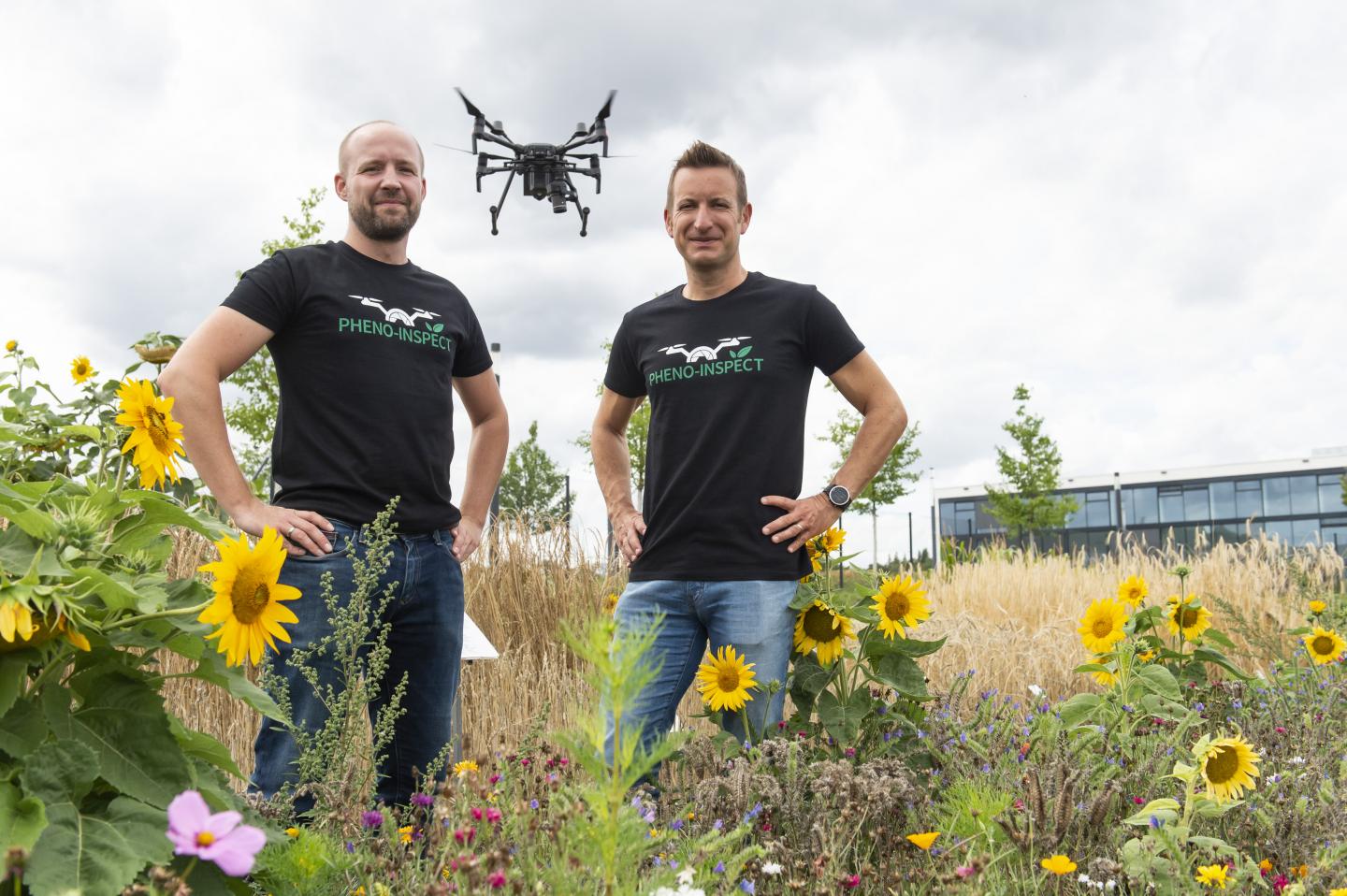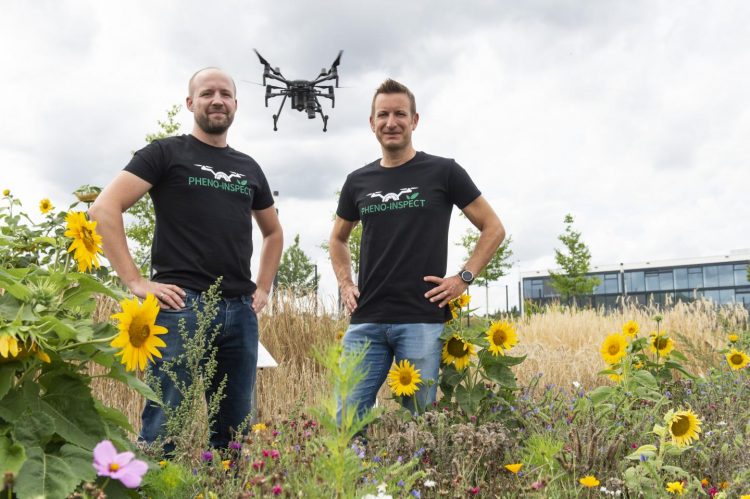Start-up of the University of Bonn records trial plots with drones and analyzes them using artificial intelligence

Credit: (c) Photo: Barbara Frommann/Uni Bonn
What’s the growth like? Have pests and diseases struck? Are the increased droughts affecting the plants? Breeders of new varieties have to collect extensive data on these questions. The start-up “Pheno-Inspect” of the University of Bonn wants to accelerate plant cultivation. Camera-equipped drones record the crops, software then automatically evaluates their properties using artificial intelligence methods. This indicates very quickly whether the new breed is a success. The project is supported by the “START-UP University Spin-offs” program with around 270,000 Euros.
With a gentle hum the drone flies over the plant breeder’s fields. During the flight it continuously takes pictures of the plants, which are later analyzed automatically using artificial intelligence. The breeder can then use the results to evaluate which varieties are particularly suited to the breeding objective. “Global population growth means that agriculture will have to produce even higher yields in the future, while the area of the arable land remains the same,” says Philipp Lottes, research associate at the Institute for Geodesy and Geoinformation at the University of Bonn. “The current bottleneck in the development of new and better varieties is high-throuput phenotyping in the field.”
This is still a very complex process in plant cultivation. In phenotyping, experts determine the appearance – or phenotype – of plants: How big are the ears of wheat in a new variety? Does the crop suffer from pests or diseases? How does the plant cope with drought? “Only when these data are statistically secure do breeders know whether their new hybrid is a success compared to other varieties,” reports Lottes. In the future, this data could be collected automatically using artificial intelligence. The start-up “Pheno-Inspect”, of which Lottes is the founder, is forging ahead with these plans.
Self-learning automatic computer methods
The geodesist already investigated machine learning methods for plant recognition in his doctoral studies, which he also wrote at the University of Bonn as part of the “PhenoRob” Cluster of Excellence. In the course of this he developed methods for using drones to take pictures of crops, from which software is able to determine, for example, the number of cultivated plants, the distribution of different weeds as well as infestation with pests and diseases. “These are self-learning, automated processes that optimize themselves on the basis of user specifications,” reports Lottes. In a “training phase”, the software learns what grain ears, dry stress symptoms or weeds look like on the basis of a large number of photos. Using statistical methods, the analysis program can then automatically evaluate images and provide comprehensive documentation in the form of maps that show which of the breeding plots suffer from nutrient deficiencies or which are especially high-yielding. “Particularly the fully automatic evaluation of the data on a large scale has great potential,” explains Prof. Dr. Cyrill Stachniss.
During the inspection, the drone flies at altitudes between ten and 100 meters above the crops. No blade of grass escapes the cameras, because the resolution provides detail down to a few millimeters. “The positioning is done via a very precise GPS, as used by geodesists,” reports Lottes. “Smartphone GPS cannot compete in accuracy.”
Funding through the “START-UP University Spin-offs” program
Together with his mentor Prof. Dr. Cyrill Stachniss, head of the working group for photogrammetry and robotics at the University of Bonn, the geodesist now receives funding as part of the “START-UP University Spin-offs” program of the state of North Rhine-Westphalia and the European Union. Over the next 18 months, Pheno-Inspect will benefit from funding of around 270,000 euros to inspect the phenotype. “We want to further develop our software and adapt it to the needs of users,” reports Lottes, who is also driving forward the business plan.
So far, the Bundessortenamt, the Institut für Zuckerrübenforschung, the Gemeinschaft zur Förderung von Pflanzeninnovationen e.V. and the Agricultural Campus Klein-Altendorf of the University of Bonn have been testing the developments of Pheno-Inspect as development partners. Lottes: “Anyone who has practical application proposals for our automated high-throughput phenotyping in the field or would like to advance the degree of automation in their business should contact us.” Conventional and organic farmers could also benefit from the method when it comes to determining the infestation level of weeds or pests in a crop or how the use of fertilizers can be optimized.
“Pheno-Inspect’s high-throughput phenotyping process is a promising approach for significantly accelerating the cultivation of new varieties,” notes Rüdiger Wolf from Technology Transfer at the University of Bonn, who advised the founders. “The start-up once again underlines the high entrepreneurial potential in the areas of health and sustainability.”
###
Information: http://www.
Media contact:
Philipp Lottes
Institute for Geodesy and Geoinformation
University of Bonn
Pheno-Inspect
Tel. +49-228-732903
E-mail: [email protected]
Prof. Dr. Cyrill Stachniss
Institute for Geodesy and Geoinformation
University of Bonn
Tel. +49-228-732714
E-mail: [email protected]
Media Contact
Philipp Lottes
[email protected]
Original Source
https:/





